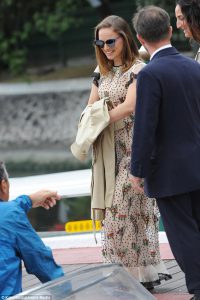Another review of Eve has arrived and its one of the most comprehensive and positive yet. Unfortunately its in Italian so we’ve had to use a translator.
The honour of opening the Corto Cortissimo section of the 65th Venice International Film Festival of Venice has fallen to the “short shortest” Natalie Portman, the actress of Closer and Léon. Favourite of the public and critics, appreciated for skill and elegance, her debut as a director has quickly aroused curiosities among fans and professionals: never had I seen a longer line to the Sala Perla for a screening reserved for short films. Available and smiling, the actress comes into the room between flashes and applause.The meeting between two generations, melancholy, love, beauty fades, love: the directorial debut of Natalie Portman and surprisingly convincing.
The short she presented does not disappoint expectations: the grace and skill of the actress transpires from the screen through her first job as director and screenwriter.
Eve tells of a date of three: grandmother, granddaughter and a charming widower. The grandmother is not any grandmother but the fascinating Lauren Bacall, symbol of femininity that survives the passing of years, despite the wrinkles, guardian of pride and elegance. To make an impression on an attractive widower (Ben Gazzara) Lola (the character of precisely Bacall) invites granddaughter Kate (Olivia Thirlby, already seen in Lost) to her first date. In the first part of the film takes place the meeting / clash between the two women: the first is a lady in love with life that despite age, still experiences the pleasure of pleasure, loves her jewellery and wears them with great naturalness, wants love, or at least to find a good companion for the bridge. The second, Kate, a girl of our times: disillusioned, cynical, too taken by all and all to think of her femininity. Both are women, each in its own way, his own generation. Characters are well constructed and even more direct.The date of three presents one of the hilarious moments, from the other melancholy moments, skillfully calibrated to each other. Lola is amused to act valuable, playing her cards of a cultured and charming woman, as if she had not even a wrinkle, as if the youthfulness was never gone, fair and conscious of pleasure. She is a cheerful figure but also very melancholic: behind the make-up and jewelry, in fact, there are hidden conflicts with her daughter but above all the heaviness of time passing. Certainly, when crossing the threshold of her room, Lola is still an attractive and witty lady, but within her there is a disturbance: read mainly through her eyes.
Bacall’s performance is extraordinary, Gazzara and Thirlby convince. The public is involved and amused. The “emotional” message is clear and does not exercise use of easy gimmicks or the usual rhetoric from fiction.
In short, thumbs up for the debut of Natalie Portman, who has not only satisfied the expectations of the public and critics, but gave a beautiful lesson in cinema to his colleagues that, for too much ambition and too many claims to be avant-garde we often forget to move and engage the public.

